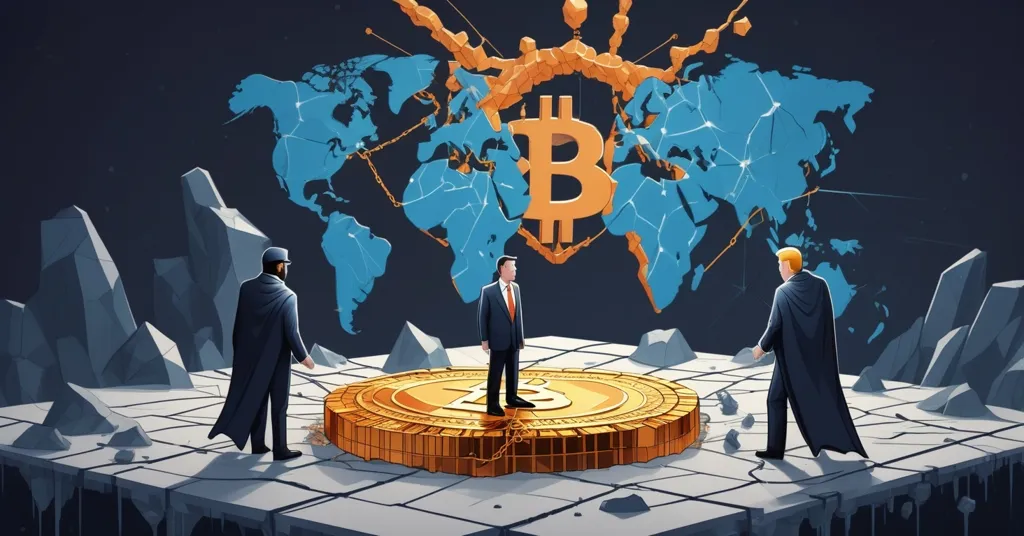EU-China Summit: Trade Wars and Geopolitical Risks Threaten Bitcoin Mining Supply Chains

EU-China Summit: Trade Wars, Geopolitical Strife, and the Crypto Connection
EU leaders Ursula von der Leyen and António Costa are set to meet Chinese President Xi Jinping in Beijing this Thursday for a summit that’s shaping up to be a battlefield of trade disputes and geopolitical grievances. With tensions soaring over China’s role in the Ukraine war, its stranglehold on critical resources, and a flood of cheap goods into European markets, this meeting is less about breakthroughs and more about drawing lines in the sand. For the crypto community, the stakes are just as high—could these global power plays choke Bitcoin mining hardware supplies or spark regulatory shifts?
- Main Conflicts: China’s support for Russia, trade imbalances, and control over rare earths fuel EU frustrations.
- Summit Expectations: A tense, one-day session with slim chances of major agreements despite China’s rosy spin.
- Crypto Impact: Supply chain disruptions and geopolitical risks threaten Bitcoin mining and blockchain hardware access.
Geopolitical Tensions: China’s Role in Ukraine Looms Large
The EU is fuming over China’s apparent alignment with Russia in the ongoing Ukraine war, a conflict that’s already reshaped global alliances and economic flows. EU Chief Diplomat Kaja Kallas has been blunt, pointing out that roughly 80% of dual-use items—goods with both civilian and military applications, like electronics or chemicals—supplied to Russia’s war machine are funneled through China. Her words cut to the core:
“China is the key enabler of Russia’s war in Ukraine… trade and security are connected.”
For those unfamiliar, dual-use items might sound benign, but they’re often critical for building weapons or surveillance tech, making China’s involvement a direct jab at EU efforts to cripple Moscow’s capabilities through sanctions.
This isn’t just speculation. Ukrainian intelligence, backed by U.S. officials, has traced Chinese components in Russian drones, with firms like CUAV Technology implicated despite public claims of restricting military sales, as detailed in evidence of China’s role in routing dual-use items. Meanwhile, Chinese Foreign Minister Wang Yi has admitted behind closed doors that Beijing doesn’t want Russia to falter, fearing a victorious U.S. would turn its full attention to China and the Asia-Pacific. His stance is chilling:
“China does not want Russia to lose in Ukraine, fearing a U.S. shift in focus to China and the Asia-Pacific.”
For the crypto crowd, this isn’t just a distant war—it’s a reminder of how geopolitical chess games can disrupt tech supply chains, including those vital for Bitcoin mining rigs and blockchain infrastructure.
Trade Wars Escalate: From Electric Vehicles to Cognac
Trade disputes are another festering wound in EU-China relations. Over the past year, the EU has ramped up its defenses, launching more than 25 investigations into Chinese products—up sharply from prior years—covering everything from mundane items like candles and sweetcorn to industrial goods like vehicle tires. The flashpoint came with hefty tariffs on Chinese electric vehicles (EVs), with Brussels accusing Beijing of dumping subsidized goods to undercut European manufacturers. China hit back hard, slapping restrictions on European medical equipment purchases and targeting luxury exports like French cognac. In June, the EU upped the ante by barring Chinese firms from high-value public medical device tenders, prompting swift retaliation from Beijing.
This tit-for-tat skirmish is more than just tariffs—it’s a full-blown economic slugfest with no knockout in sight. For those new to trade lingo, “dumping” means flooding a market with cheap goods to kill off local competition, often backed by government subsidies. The EU sees this as unfair play, while China frames it as legitimate commerce. The summit is unlikely to cool these tensions, with both sides digging in, as explored in broader context on EU-China trade relations. Crypto enthusiasts should take note: these trade barriers could ripple into tech sectors, hiking costs or limiting access to hardware critical for blockchain networks. If you thought Ethereum gas fees were a pain, wait until trade wars jack up the price of mining GPUs.
Rare Earths: China’s Economic Leverage and Crypto’s Achilles’ Heel
Perhaps the most insidious issue is China’s dominance over rare earths and critical materials—minerals essential for tech, green energy, and defense, from smartphone chips to electric vehicle batteries. The EU views this control as outright economic coercion, a tactic where market power is weaponized to pressure or manipulate other nations. Ursula von der Leyen didn’t mince words at a recent G7 meeting:
“China is weaponizing its monopoly on rare earth supply as a geopolitical tool to undercut rivals in critical sectors.”
With China controlling over 80% of global production, its export restrictions—initially aimed at the U.S.—have hammered European industries as collateral damage, a point emphasized in von der Leyen’s statements on supply chain risks.
For the uninitiated, rare earths aren’t just dirt; they’re the lifeblood of modern hardware, including the specialized computers called mining rigs that secure Bitcoin’s network through complex calculations. Estimates suggest over 60% of Bitcoin miners rely on Chinese-made ASICs (application-specific integrated circuits), and any disruption in rare earth supplies could spike costs or halt production. This isn’t theoretical—price hikes in 2021 tied to Chinese export controls already dented mining profitability. The crypto space, often touted as a bastion of decentralization, remains tethered to these centralized bottlenecks, with discussions on platforms like Reddit highlighting Bitcoin mining supply chain vulnerabilities. Could this summit push the EU to seek alternative sources, or are we stuck in China’s grip?
Summit Outlook: Confrontation Over Collaboration
Beijing is spinning this summit as a shining moment of multilateralism, a chance to showcase openness and dialogue. But don’t buy the hype. EU officials and analysts are bracing for a bruising encounter, with Abigaël Vasselier from MERICS Think Tank warning of a “very challenging session” rather than a deal-making opportunity, as noted in coverage of the upcoming EU-China talks. China’s recent hardball tactics, reminiscent of Trump-era trade strategies, signal no intent to concede ground. Even the logistics scream friction—the event was slashed from two days to one due to a supposed “scheduling conflict” on China’s end, and a planned business roundtable was yanked from Hefei to Beijing. Subtle snub or logistical hiccup? You decide.
Experts like Noah Barkin from Rhodium Group predict this meeting will join a long list of EU-China talks that deliver next to nothing, while Mathieu Duchatel from Institut Montaigne describes Europe’s mood as “extremely pessimistic.” China might dangle carrots like reviving the stalled EU-China Comprehensive Agreement on Investment—frozen since 2021 over human rights disputes—or push for climate cooperation with a symbolic joint statement. But with core issues like trade imbalances and Ukraine unresolved, any progress feels like a mirage, a sentiment echoed in recent updates on the 2023 Beijing summit. For crypto advocates, the lack of resolution keeps supply chain risks squarely on the table.
Trump’s Shadow: A Wild Card in the Mix
Hovering over this mess is the unpredictable influence of U.S. policy under Donald Trump. With his return to power, threats of 30% tariffs on EU exports and potential secondary tariffs on nations trading with Russia have both Brussels and Beijing on edge. Trump’s recent wins with China—slashing some tariffs and resuming exports of Nvidia AI chips—contrast with his harsher stance on Europe, creating a lopsided dynamic. This triangular tension leaves the EU in a bind: cozy up to the U.S. and risk further alienating China, or carve out independent deals with Xi Jinping when trust is at rock bottom.
For the Bitcoin maximalist crowd, Trump’s erratic trade policies underscore the need for financial sovereignty—Bitcoin’s censorship-resistant nature could shield users from such centralized power plays. Yet, even decentralized systems aren’t immune to hardware shortages or geopolitical fallout, a concern raised in debates over rare earths in tech trade wars. Altcoin projects on Ethereum, with smart contracts for supply chain transparency, might offer niche solutions, but they’re no silver bullet when nation-states hold the reins. This summit isn’t just EU versus China; it’s a microcosm of global economic warfare where crypto’s future hangs in the balance.
Decentralization as a Counterweight: Can Crypto Break Free?
Let’s zoom in on what this means for our community. Bitcoin and blockchain tech often get hyped as escapes from centralized control, but the EU-China standoff exposes a harsh truth: we’re still chained to physical infrastructure dominated by geopolitical giants. Rare earth scarcity could throttle Bitcoin mining operations, driving up costs and squeezing smaller players out of the game. A 2021 spike in mineral prices already showed how vulnerable profitability is—imagine a full-blown trade war cutoff. Meanwhile, over 60% of mining hardware traces back to Chinese manufacturers, a dependency that’s anything but decentralized, with insights available on how trade wars impact Bitcoin mining equipment.
But there’s a flip side. Could China’s chokehold spark innovation? If the EU pushes for alternative rare earth sources—think Australia or Canada—crypto hardware manufacturing might diversify, reducing reliance on a single point of failure. Blockchain-based supply chain tracking, often built on platforms like Ethereum, could also help verify ethical sourcing and bypass trade barriers. Bitcoin itself offers a hedge against economic coercion, letting users transact outside fiat systems tied to national agendas. Yet, until mining rigs and chips are free from centralized supply lines, true sovereignty remains elusive.
Regulatory Ripples: EU Policies and Crypto’s Future
Beyond hardware, there’s a regulatory angle to chew on. The EU’s drive for tech independence amid China tensions could spill into tighter crypto rules. Brussels is already wary of foreign influence in digital spaces, and frameworks like MiCA (Markets in Crypto-Assets) signal a push for control over decentralized finance (DeFi). If trade wars escalate, expect the EU to double down on localizing tech and finance, potentially clamping down on borderless systems like Bitcoin under the guise of security. China, too, could weaponize its crypto bans to favor state-backed digital currencies over open networks, a topic discussed in analysis of EU-China relations affecting cryptocurrency hardware.
On the other hand, geopolitical chaos might boost crypto adoption as a safe haven. When fiat economies wobble under tariff threats or supply shocks, Bitcoin’s fixed supply and global reach shine brighter. The question is whether regulators will let decentralized finance flourish or strangle it with red tape. For altcoin fans, niche protocols tackling supply chain opacity or cross-border payments could gain traction if traditional systems falter—but only if they survive the regulatory gauntlet.
Key Questions on EU-China Tensions and Crypto Implications
- What’s fueling the EU-China conflict?
The clash stems from China’s support for Russia in Ukraine, trade imbalances with cheap goods flooding Europe, and its monopoly on rare earths, seen as economic coercion by the EU. - How does China’s rare earth dominance hit Bitcoin mining?
Rare earths are crucial for mining rigs and hardware; China’s control over 80% of supply means export curbs could spike costs or halt production, denting Bitcoin mining profitability. - Can decentralization shield crypto from geopolitical risks?
Partially—Bitcoin offers financial sovereignty against trade war fallout, but physical hardware dependencies keep the industry vulnerable to centralized supply chain disruptions. - Will the summit resolve anything for the crypto space?
Unlikely. With trade and security disputes dominating, supply chain risks for blockchain tech will persist, though a minor climate statement might hint at future material access talks. - Could EU-China tensions reshape crypto regulation?
Yes, the EU’s focus on tech independence might tighten rules on DeFi and Bitcoin, while economic instability could drive adoption as a hedge against fiat uncertainty.
At the end of the day, the EU-China summit lays bare the brutal reality of global economics—a cutthroat arena where leverage and coercion reign supreme, not unlike the worst bear markets in crypto. As champions of decentralization, we see Bitcoin as a potential escape hatch from these power games, a way to reclaim freedom from centralized chokeholds. Yet, the hard truth is that our industry isn’t untouchable; mining rigs don’t grow on trees, and rare earths aren’t mined on the blockchain. Even altcoin innovations, like Ethereum’s supply chain tools, can’t fully untangle these knots while nation-states bicker. So, can crypto truly outrun geopolitical chaos, or are we still leashed to the old world’s baggage? Don’t expect Xi or von der Leyen to drop a “#BitcoinFixesThis” anytime soon.



